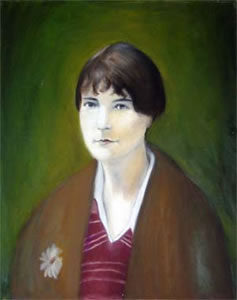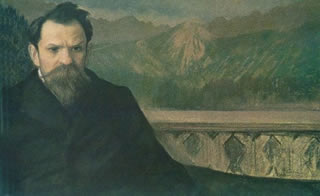De Nieuw-Zeelandse schrijfster Katherine Mansfield werd geboren op 14 oktober 1888 in Wellington. Zie ook alle tags voor Katherine Mansfield op dit blog.
Uit: Bliss (The Man Without A Temperament)
“He stood at the hall door turning the ring, turning the heavy signet ring upon his little finger while his glance travelled coolly, deliberately, over the round tables and basket chairs scattered about the glassed-in veranda. He pursed his lips–he might have been going to whistle–but he did not whistle–only turned the ring–turned the ring on his pink, freshly washed hands.
Over in the corner sat The Two Topknots, drinking a decoction they always drank at this hour–something whitish, greyish, in glasses, with little husks floating on the top–and rooting in a tin full of paper shavings for pieces of speckled biscuit, which they broke, dropped into the glasses and fished for with spoons. Their two coils of knitting, like two snakes, slumbered beside the tray.
The American Woman sat where she always sat against the glass wall, in the shadow of a great creeping thing with wide open purple eyes that pressed–that flattened itself against the glass, hungrily watching her. And she knoo it was there–she knoo it was looking at her just that way. She played up to it; she gave herself little airs. Sometimes she even pointed at it, crying: “Isn’t that the most terrible thing you’ve ever seen! Isn’t that ghoulish!” It was on the other side of the veranda, after all . . . and besides it couldn’t touch her, could it, Klaymongso? She was an American Woman, wasn’t she, Klaymongso, and she’d just go right away to her Consul. Klaymongso, curled in her lap, with her torn antique brocade bag, a grubby handkerchief, and a pile of letters from home on top of him, sneezed for reply.
The other tables were empty. A glance passed between the American and the Topknots. She gave a foreign little shrug; they waved an understanding biscuit. But he saw nothing. Now he was still, now from his eyes you saw he listened. “Hoo-e-zip-zoo-oo!” sounded the lift. The iron cage clanged open. Light dragging steps sounded across the hall, coming towards him. A hand, like a leaf, fell on his shoulder. A soft voice said: “Let’s go and sit over there–where we can see the drive. The trees are so lovely.” And he moved forward with the hand still on his shoulder, and the light, dragging steps beside his. He pulled out a chair and she sank into it, slowly, leaning her head against the back, her arms falling along the sides.”

Portret door Shoshana Kertesz
De Duitse dichteres, schrijfster en filosofe Margarete Susman werd geboren op 14 oktober 1872 in Hamburg. Zie ook alle tags voor Margarete Susman op dit blog.
Uit: Ich habe viele Leben gelebt. Erinnerungen
Diesem Wissen entspricht ein fast gleichzeitiges Erlebnis: Ich stehe an einem der hohen Fenster unseres Kinderzimmers, an das mir – da ich es bald verlassen mußte – gewiß keine Erinnerung geblieben wäre, wenn nicht dieses frühe starke Erlebnis es für immer in mein Bewußtsein eingegraben hätte. Ich sehe die schwarzen Vorhänge mit den großen roten Blumen, die längliche Form des hohen Zimmers, an dessen einem Fenster ich stand, und ich fühle noch heute das bittere Elend, das damals mein Kinderherz erfüllte. Ich hatte eben vorher in einem Streit meine Schwester mit einer Puppe an den Kopf geschlagen, und nun stand sie im Zimmer hinter mir und weinte, und meine Mutter tröstete sie zärtlich. Ich fühlte mich trostlos und verlassen, und aus diesem schmerzlichen Verlassensein stieg die Frage in mir auf: „Ist das, was jetzt in mir ist, wohl Mitleid?” – eine Frage, die ich – da sie nach dem Wesen einer mir nahen doch verborgenen Wahrheit fragte – vielleicht die erste philosophische Frage meines Lebens nennen möchte. Dieses Elend war natürlich nicht Mitleid, sondern Reue und das Gefühl des Ausgestoßenseins. Aber das Wort Mitleid, das ich damals noch nicht verstand, mußte mich schon oft aus Gesprächen der Erwachsenen getroffen haben, und dies ist sicher kein Zufall gewesen. Denn auch heute noch erscheint mir das Mitleid als eines der schwersten
Probleme des Menschenlebens, sowohl im Einzelnen wie im Sozialen. Denn so sicher das Wort Mitleid zu unserem Leben gehört, ist es doch das Seltenste und Schwerste, weil es nur da ganz wirklich ist, wo ein Mensch ganz in das Leben eines anderen einkehrt, während ihm doch durch sein eigenes Dasein eine unüberschreitbare Grenze gesetzt ist. Dies alles wußte ich damals noch nicht, aber durch den frühen Schmerz streifte ich an eine der Wurzeln meines Lebens, die des Mitlebens überhaupt.
Eine zweite Erinnerung stammt aus einer um wenige Jahre späteren Zeit. Sie führt mich in ein anderes Zimmer, das mir auch nur durch die Stärke eines Erlebnisses im Gedächtnis geblieben ist. Es war dunkel um uns; nur die große hellgedeckte Platte des Tisches war durch die Lampe über ihr aus dem Dunkel herausgeschnitten. Wir hatten eben mit unseren Eltern, wie immer nach deutschem Brauch, Weihnachten gefeiert, und nun saßen wir vor dem Abendessen mit dem Kinderfräulein, an dessen große dunkle Augen ich mich heute noch erinnere – ich weiß auch noch, daß sie Amanda hieß –, an diesem Tisch, wo sie uns Geschichten erzählte. In meinem Herzen brannte noch der hohe
Christbaum mit seinen vielen hellen Lichtern, die den großen Saal durchstrahlten.”

Hamburg in kersttijd
De Poolse schrijver Stefan Żeromski werd geboren op 14 oktober 1864 in Strawczyn in de buurt van Kielce. Zie ook alle tags voor Stefan Żeromski op dit blog.
Uit: Forebodings (Vertaald door Marie Busch)
“In the darkest corner of the ward, in the bed marked number twenty-four, a farm labourer of about thirty years of age had been lying for several months. A black wooden tablet, bearing the words
‘Caries tuberculosa’, hung at the head of the bed, and shook at each movement of the patient. The poor fellow’s leg had had to be amputated above the knee, the result of a tubercular decay of the bone. He was a peasant, a potato-grower, and his forefathers had grown potatoes before him. He was now on his own, after having been in two situations; had been married for three years and had a baby son with a tuft of flaxen hair. Then suddenly, from no cause that he could tell, his knee had pained him, and small ulcers had formed. He had afforded himself a carriage to the town, and there he had been handed over to the hospital at the expense of the parish.
He remembered distinctly how on that autumn afternoon he had driven in the splendid, cushioned carriage with his young wife, how they had both wept with fright and grief, and when they had finished crying had eaten hard-boiled eggs: but what had happened after that had all become blurred–indescribably misty. Yet only partially so.
Of the days in the hospital with their routine and monotony, creating an incomprehensible break in his life, his memory retained nothing; but the unchanging grief, weighing like a slab of stone on a grave, was ever present in his soul with inexorable and brutal force during these many months. He only half recalled the strange wonders that had been worked on him: bathing, feeding, probing into the wound, and later on the operation. He had been carried into a room full of gentlemen wearing aprons spotted with blood; he was conscious also of the mysterious, intrepid courage which, like a merciful hand, had supported him from that hour.”

Stefan Żeromski (14 oktober 1864 – 20 november 1925)
Portret door Leona Wyczółkowskiego
